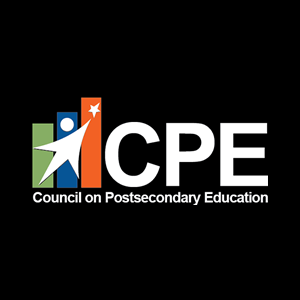Latest News
To view other great content, visit our news area >>

Meet Our New Intern! Katie Black
December 12, 2025
Meet Katie Black, one of our new interns in the Data and Advanced Analytics Unit! Katie currently attends Marshall University.

CPE announces 22.8% surge in health-related majors since 2022
December 9, 2025
Enrollment in health-related majors across all public and private colleges and universities has increased 22.8% - or by 6,953 students - since 2022.

Meet Our New Intern! Annalee Whitten
December 4, 2025
Meet Annalee Whitten, one of our new interns in the Student Access & Success Unit.

Kentucky Council on Postsecondary Education approved as Department of Defense SkillBridge employer
November 11, 2025
CPE has been formally approved by the U.S. Department of Defense as an official SkillBridge employer.
Featured Events and Meetings
Legislative Review
Kentucky By the Numbers
- 8Public Universities
- 58%Six-Year Graduation Rate
- 30K+Degrees Awarded in AY23
- 16Community and Technical Colleges
- 40%Three-Year Graduation Rate
- 40KCredentials Awarded in AY23
Kentucky's Progress to the 60x30 Goal
Educational Attainment of Kentucky Adults (2023)

Increases in the Number of Kentucky Credential Holders

Our President

"I believe that higher education unlocks the human potential, that college gives us the time and opportunity to explore our interests, to train for a career that challenges and inspires us. And it gives us a greater sense of meaning and purpose in life."
As a first-generation college student from rural Clay County, Kentucky, President Aaron Thompson experienced first-hand the transformative power of a college credential. Learn more about President Thompson >>
Kentucky's Strategic Agenda for Postsecondary Education
The strategic agenda serves as a blueprint to meet Kentucky’s educational attainment goal—to raise the percentage of Kentuckians with a postsecondary degree or certificate to 60% by the year 2030. It identifies five strategic priorities for higher education that will guide innovation and improvement through 2030. Learn more about the strategic agenda >>
- Transitions
- Affordability
- Success
- Talent
- Value

Making Higher Education Matter to Kentucky
Higher Education Matters, a statewide public awareness campaign in collaboration with Kentucky’s colleges and universities, is about promoting college going and elevating the importance of higher education to Kentucky’s residents and economy. Check out the website at KYHigherEDMatters.org for student resources, links to campuses, and marketing resources for our ambassadors.
Why Higher Ed Matters
 Earnings: College graduates earn more and are less likely to be unemployed and rely on public
assistance.
Earnings: College graduates earn more and are less likely to be unemployed and rely on public
assistance. Health: College graduates are more likely to have access to better healthcare, exercise and
enjoy better health.
Health: College graduates are more likely to have access to better healthcare, exercise and
enjoy better health. Civic Responsibility: College graduates are more likely to vote, donate to charity and be civically engaged.
Civic Responsibility: College graduates are more likely to vote, donate to charity and be civically engaged. Literacy: College graduates are more likely to read to their children and be more supportive
of their education overall.
Literacy: College graduates are more likely to read to their children and be more supportive
of their education overall. Employment: College graduates are more likely to find jobs and stay employed, even in a down
economy.
Employment: College graduates are more likely to find jobs and stay employed, even in a down
economy. Economy: The state gains more from college graduates through higher earnings and less dependence
on public assistance.
Economy: The state gains more from college graduates through higher earnings and less dependence
on public assistance.
